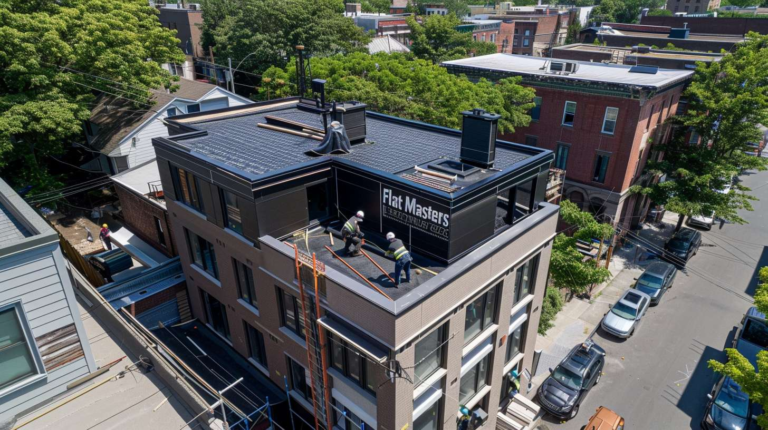Professional Flashing Installation on Flat Roof Services
Look, after twenty-three years working flat roofs across Queens, I can tell you that flashing installation on flat roof systems is where most contractors either make it or break it. You mess up the flashing, and you're looking at water damage that'll cost you thousands down the road.
At Flat Masters NY, we've installed flashing on everything from those century-old Astoria apartment buildings to brand new commercial spaces in Long Island City. And let me be straight with you - this isn't something you want to DIY.
Understanding Flat Roof Flashing Installation
When people ask me how to install flashing on flat roof systems, I always start with the basics. Flashing is essentially your roof's waterproof barrier at all the vulnerable spots - around HVAC units, vent penetrations, parapet walls, and where your roof meets vertical surfaces. On a flat roof, water doesn't run off like it does on a pitched roof, so every seal has to be absolutely perfect.
Here's what most people don't realize: flat roof flashing isn't just about slapping some metal strips down and calling it a day. The membrane has to be properly integrated, the base flashing needs to extend the right height up vertical surfaces, and counter-flashing has to overlap correctly to shed water away from penetrations.
The Reality of Installing Flashing on a Flat Roof
Last month we had a job on 31st Avenue where the previous contractor had attempted their own flashing work. Water was coming through the ceiling every time it rained because they hadn't properly sealed around the rooftop unit. The homeowner asked me, "How hard could it be? I watched YouTube videos about how to install flat roof flashing."
I had to explain that those videos don't show you how Queens weather affects different materials, or how thermal expansion and contraction will open up gaps in poorly installed flashing within six months. They don't teach you that our salt air from the East River requires specific sealants, or that Building Department inspections here have gotten stricter about flashing details since the new codes went into effect.
Professional Flashing Installation Process
When we handle installing flashing on a flat roof, here's what actually happens:
- Complete inspection of all penetrations and roof-to-wall transitions
- Removal of any old, failed flashing materials
- Proper substrate preparation and priming
- Installation of base flashing integrated with the roof membrane
- Counter-flashing installation with proper overlap and fastening
- Sealant application using commercial-grade materials rated for our climate
- Final inspection and water testing before we leave the job
The thing about flashing work is that every penetration is different. That vent pipe coming up through your roof? Different approach than the HVAC unit. The parapet wall on the east side getting hammered by weather? That needs reinforced detailing that most contractors skip.
Materials and Methods That Actually Work
We use modified bitumen flashing materials for most applications here in Queens because they handle our temperature swings better than cheaper alternatives. The base flashing gets mechanically fastened every six inches, not just adhered like some contractors do to save time.
For counter-flashing, we prefer fabricated metal pieces over the pre-formed stuff you get at supply houses. My sheet metal guy Jimmy has been making custom flashing for us for fifteen years, and he knows exactly how much expansion joint space to leave for different building materials.
Oh, and another thing about sealants - we only use polyurethane or silicone sealants rated for constant water exposure. That cheap stuff from the hardware store will fail within a year, guaranteed.
Common Flashing Problems We Fix
I can't tell you how many times we get calls about leaks that trace back to flashing failures. Here's what we see most often:
- Inadequate flashing height - code requires 8 inches minimum up vertical surfaces
- Poor membrane integration at the base flashing
- Missing or inadequate counter-flashing
- Thermal movement cracks in rigid flashing materials
- Fastener failures from inadequate substrate attachment
Just last Tuesday we finished a job in Elmhurst where the homeowner had been patching the same leak for three years. Turns out the original contractor never installed proper step flashing where the roof meets the brick wall. Water was running down inside the wall cavity every time it rained.
Why Professional Installation Matters
Look, I get it - roofing work is expensive, and flashing seems like a small detail. But here's the thing: flashing failures cause 90% of the leak calls we get. When flashing fails, it's not just a small drip. Water finds a way into your building envelope, and then you're dealing with structural damage, mold issues, and interior repairs that cost way more than proper flashing installation would have cost in the first place.
We warranty our flashing work for ten years because we know it's going to last. We use proper materials, follow manufacturer specifications, and understand how different building materials interact over time.
Local Code Requirements and Inspections
Queens has specific requirements for flashing installation that change depending on your building type and roof system. Commercial buildings need fire-rated flashing assemblies at certain locations. Buildings over three stories have different wind uplift requirements that affect how we fasten the flashing.
We handle all the permit applications and inspections. The Building Department knows our work, and we don't get callbacks on our installations.
Getting Your Flashing Done Right
If you're dealing with leaks around roof penetrations, or you're planning new equipment installation on your flat roof, don't wait until the next heavy rain to address flashing issues. We provide free inspections for Queens property owners, and we can usually tell you exactly what's wrong and how to fix it permanently.
At Flat Masters NY, we've built our reputation on doing flashing work right the first time. Call us at (917) 994-7618, and let's talk about getting your roof watertight for good.


